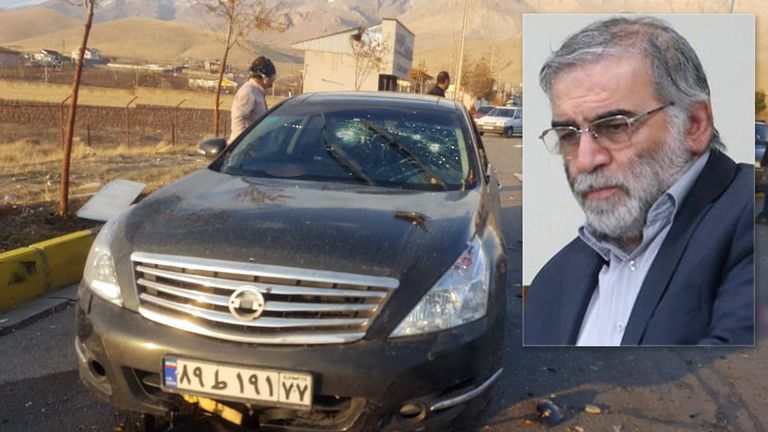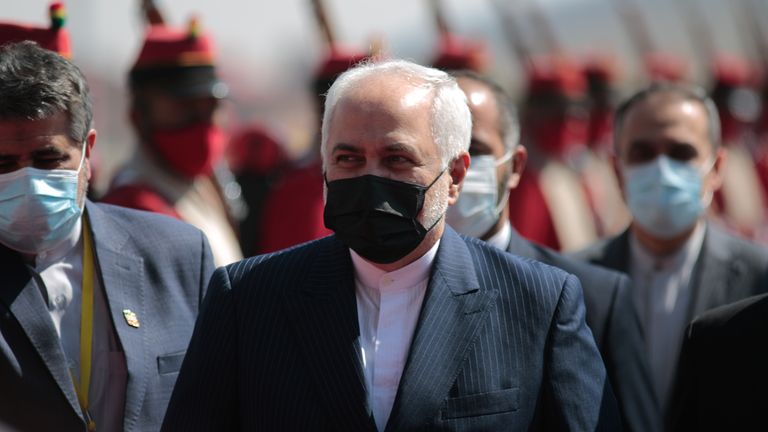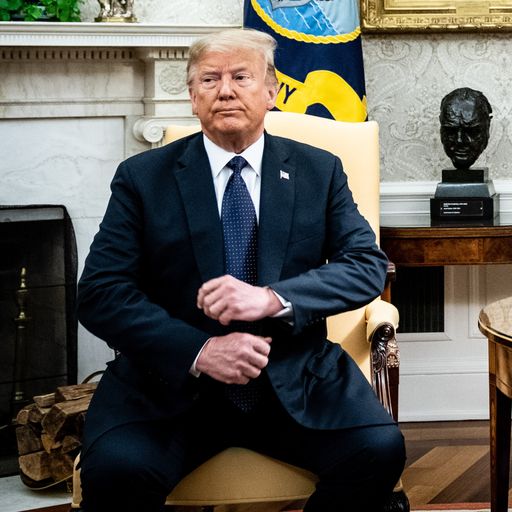There are "serious indications" Israel was involved in the killing of a senior Iranian nuclear scientist, Iran's foreign minister has said.
Mohsen Fakhrizadeh was injured in a shootout and died hospital on Friday, Iranian state media reported.
"Unfortunately, the medical team did not succeed in reviving him, and a few minutes ago, this manager and scientist achieved the high status of martyrdom after years of effort and struggle," a statement by Iran's armed forces said.
Iran's foreign minister Mohammad Javad Zarif said: "Terrorists murdered an eminent Iranian scientist today. This cowardice - with serious indications of Israeli role - shows desperate warmongering of perpetrators."
Iranian defence minister Brigadier General Amir Hatami said the assassination displayed "the depth of enemies' hatred" towards the country.
"Iran calls on int'l community-and especially EU-to end their shameful double standards & condemn this act of state terror."
Israel has long alleged that Mr Fakhrizadeh had led a military nuclear programme in the early 2000s, but the country declined to comment following the news on Friday.
The attack is said to have happened in Absard, a small city just east of the capital, Tehran, according to the semi-official Fars news agency, believed to be close to the country's Revolutionary Guard.
It said witnesses heard the sound of an explosion and then machine gun fire and the attack targeted a car that Mr Fakhrizadeh was in.
Pictures and videos circulating online show a Nissan saloon car with bullet holes through the windshield and blood pooled on the road.
Those injured in the attack, including the nuclear scientist's bodyguards, were later taken to a local hospital, the agency said.
The semi-official news agency Tasnim earlier reported that "terrorists blew up another car" before firing on a vehicle
carrying Mr Fakhrizadeh and his bodyguards in an ambush outside the capital.
While no group has immediately claimed responsibility of the attack, Iranian media has noted the interest that Israeli prime minister Benjamin Netanyahu had previously shown in the nuclear scientist.
Mr Netanyahu once called out in a news conference, saying, "Remember that name", in reference to Mr Fakhrizadeh.
State television cited sources confirming the death on Friday and said it would offer more information shortly.
Iran's state television published a photo of security forces blocking off the road where the attack took place on its website.
Hossein Salami, chief commander of the paramilitary guard, appeared to acknowledge the attack on Mr Fakhrizadeh.
"Assassinating nuclear scientists is the most violent confrontation to prevent us from reaching modern science," he tweeted.
Meanwhile, Hossein Dehghan, an adviser to Iran's supreme leader and a presidential candidate in Iran's 2021 election, issued a warning on Twitter.
"In the last days of their gambling ally's political life, the Zionists seek to intensify and increase pressure on Iran to wage a full-blown war," Mr Dehghan wrote, appearing to refer to President Donald Trump.
:: Subscribe to the Daily podcast on Apple Podcasts, Google Podcasts, Spotify, Spreaker
He added: "We will descend like lightning on the killers of this oppressed martyr and we will make them regret their actions!"
Mr Fakhrizadeh is believed to have headed what the UN nuclear watchdog and US intelligence services believe was a coordinated nuclear weapons programme in Iran, known as the Amad, or Hope programme, which was halted in 2003.
He is also distinctly the only Iranian scientist named in the International Atomic Energy Agency's 2015 "final assessment" of open questions about Iran's nuclear programme and whether it was aimed at developing a nuclear bomb.
Tehran has long insisted its nuclear programme is peaceful.
The International Atomic Energy Agency claims that the Amad programme ended in the early 2000s and its inspectors now monitor Iranian nuclear sites as part of Iran's now-unravelling nuclear deal with world powers.




